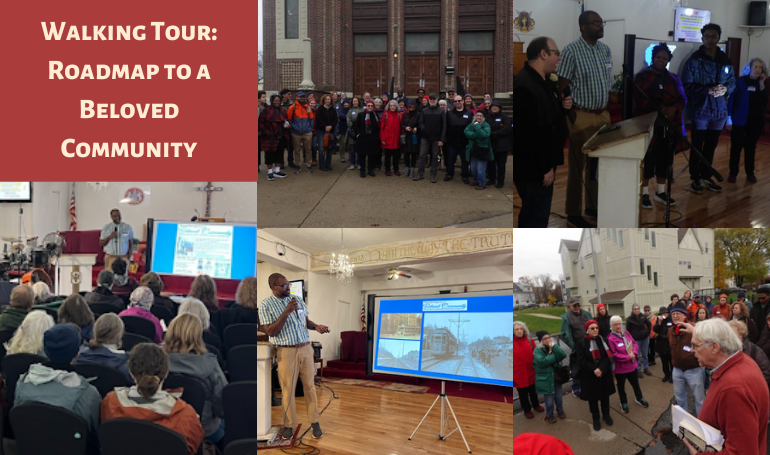
Walking Tour: Roadmap to a Beloved Community
Walking Tour: Roadmap to a Beloved Community – Reflections from Michelle Golden
Having lived in Boston for the past 30+ years, I can say that the racial inequities of neighborhoods, housing, schools, job opportunities, transportation and health care are horribly apparent. But it has only been recently, through two related programs put on by Boston Workers Circle’s AFREJ (Acting for Racial and Economic Justice Committee), that I learned more deeply about the Boston Jewish Community’s passive and active role in producing this reality.
Early this year, over several zoom sessions, members of AFREJ read and discussed the book The Death of an American Jewish Community: A Tragedy of Good Intentions, by Hillel Levine and Lawrence Harmon. This book provides a rich description of the thriving Jewish community that existed in Roxbury, Dorchester and Mattapan for about 50 years in the 1900’s, (a community that until this program I knew little about). Its main focus, however, is about the rapid demographic and economic upheaval in the area beginning in the late 1960’s. The combination of initiatives and actions by federal and local programs and agencies, banks, realtors, as well as Jewish institutions and Jewish residents resulted in most of the 90,000 Jewish residents moving from their homes in these neighborhoods within a four year time span (1968-1972), to be replaced by many in Boston’s black community. Because of the redlining and blockbusting that hastened this turnover, and the type of federal loan program that made it possible, many of the mortgages sold to new occupants had been foreclosed by 1974. Subsequent city and civic abandonment and neglect caused a rapid deterioration of the area, the results of which linger to this day. This upheaval was not a coincidental occurrence–there are many villains in Levine’s and Harmon’s story, including antisemitism and racism in the general society and within the Jewish community. And, it is not a history unique to Boston. Many other cities around the country, including Cleveland where I grew up, experienced a similar version of what occurred in Roxbury, Dorchester and Mattapan.
My understanding of this complex history and the long-lasting damage that it caused was enhanced in November by participating in the first event of a program entitled: A Roadmap to a Beloved Community: Interwoven Histories of Jewish & African American Bostonians, a collaboration between BWC’s AFREJ and the Afrimerican Culture Initiative Inc., the Forum for Racial Equity & Justice, and the Hyde Park Community Input Board. We met in a Dorchester church that had once been a synagogue, and before we began our walking tour, Marlon Solomon of Afrimerican Culture Initiative, spoke to us about the devastating effects on the Dorchester community of the removal of the trolley tracks that had provided public access to local businesses and to major attractions such as Franklin Park. On our walking tour, led by long-time community activist and Dorchester resident, Lew Finfer, we visited 3 former synagogues, which are now churches, and a previous Jewish gathering hub, the G&G Deli, which is now a hardware store. While the layering of one culture upon the edifices of another was fascinating to see (the church in which we met had a menorah among its displayed artifacts), the physical, infrastructure and economic challenges of the neighborhood, the legacy of the history, were also quite apparent and discussed. Additionally, several participants in our group had grown up in Jewish Mattapan, and their feelings of loss of this neighborhood, and their lack of understanding until recently of the societal forces that had resulted in their displacement, was also a moving and palpable part of the afternoon event.
So what should I do with this new understanding, especially since a core belief for me as a secular Jew is tikkun olam, my duty to help repair my world? For me, it makes the discussion of and acts of reparations for Boston’s communities of color seem very important. A core AFREJ commitment has been to work toward actualizing one of the five UN dimensions of reparations: the guarantee of non-repeat. AFREJ works, for example, with the Boston Ujima Project, a solidarity economy initiative transforming the neighborhoods of Roxbury, Dorchester, and Mattapan. I look forward to more ways that we in AFREJ might work with our new multiracial partners toward creating Beloved Community.
